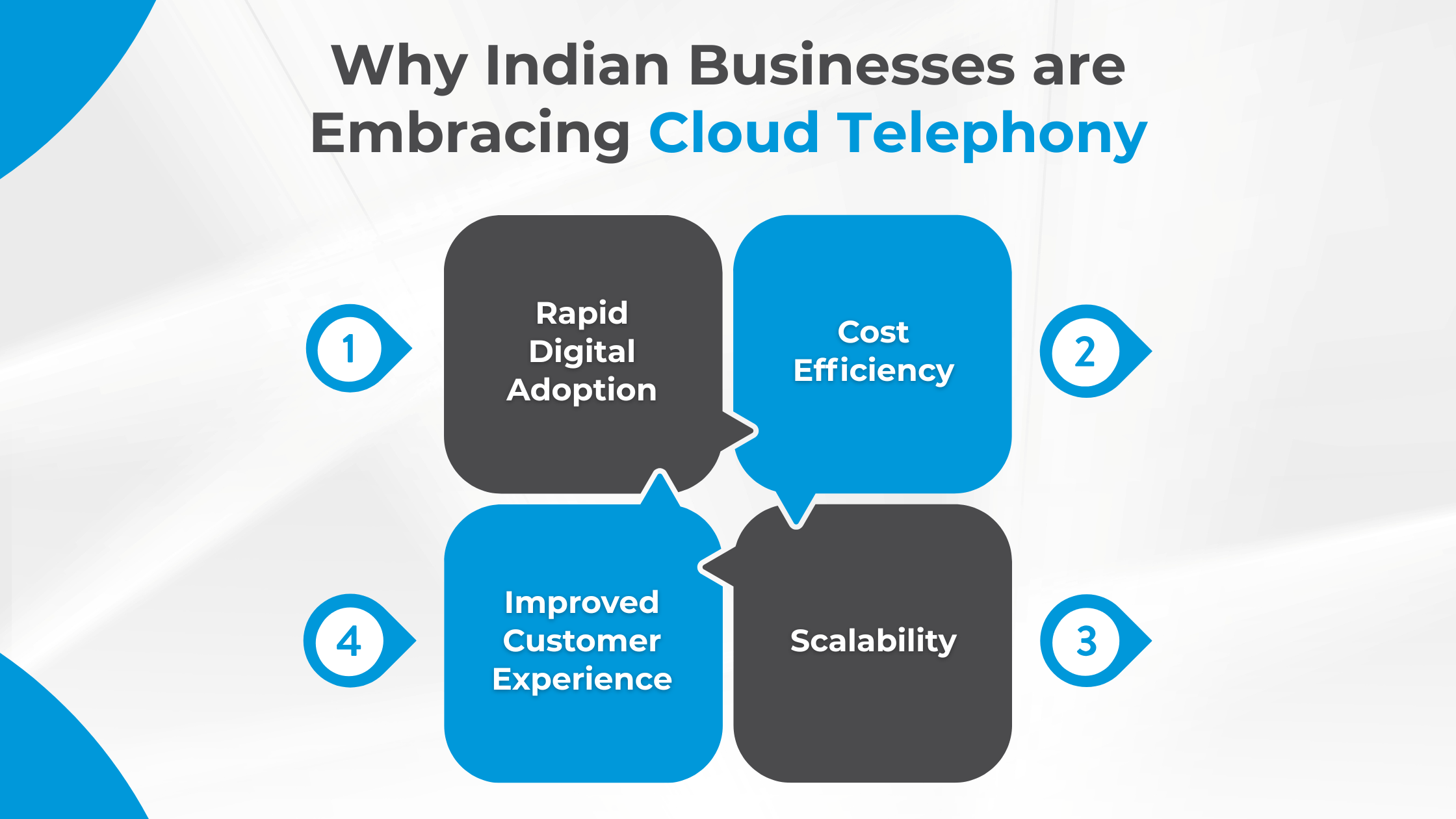In the fast-evolving world of business communication, cloud telephony in India has emerged as a transformative solution. It has shifted how companies manage customer interactions, internal communications, and remote team coordination. Gone are the days when expensive hardware and complex installations were necessary to set up a reliable phone system. Today, cloud telephony solutions in India offer scalable, cost-effective, and feature-rich alternatives that enable businesses to operate with agility and professionalism.
However, with so many providers claiming to offer the best cloud telephony services in India, choosing the right one can be overwhelming. This blog explores the key factors that distinguish a great cloud telephony provider from the rest, helping Indian businesses make informed decisions that drive growth and efficiency.
Before diving into the selection criteria, it’s important to understand what cloud telephony entails. Cloud telephony is a technology that moves your traditional phone systems to the cloud. Calls are made and received over the internet, eliminating the need for PBX systems and allowing businesses to run their phone operations through software, APIs, and web interfaces.
This not only reduces infrastructure costs but also enhances flexibility, scalability, and integration capabilities. For businesses in India, where remote work, customer service, and digital operations are expanding rapidly, cloud telephony is no longer a luxury; it’s a necessity.

India’s rapid shift toward digital infrastructure, driven by initiatives like Digital India, has accelerated the adoption of cloud-based technologies. Businesses across sectors are embracing cloud telephony for its ease of deployment, minimal infrastructure needs, and ability to support remote work. With growing internet penetration and mobile-first consumers, cloud telephony offers a modern communication backbone. It empowers Indian companies to stay competitive, agile, and responsive in an increasingly digital and customer-driven marketplace.
Cloud telephony eliminates the need for expensive hardware and maintenance, offering a pay-as-you-go model ideal for Indian businesses. With no upfront capital investment, companies can reduce operational costs while accessing enterprise-grade features. This affordability makes cloud telephony a smart choice for startups and SMEs seeking professional communication tools without straining their budgets.
A scalable cloud telephony solution grows with your business. Whether expanding teams, adding new locations, or handling seasonal call spikes, top providers like Kommuno offer flexible plans and infrastructure that adjust effortlessly. This ensures consistent performance, cost-efficiency, and uninterrupted communication as your business evolves in size and complexity.
Cloud telephony significantly enhances customer experience by enabling faster, smarter, and more personalized interactions. Features like IVR, intelligent call routing, and CRM integration ensure customers are connected to the right agent quickly. Real-time call tracking and analytics help monitor service quality and identify areas for improvement. With multilingual support and 24/7 availability, businesses can cater to diverse customer bases across India, building trust, loyalty, and long-term satisfaction with every interaction.
To find the best cloud telephony providers in India, businesses should assess the following features:
Downtime in communication can result in lost revenue and poor customer experience. A top-tier provider guarantees high uptime (preferably 99.9% or higher) backed by Service Level Agreements (SLAs). Redundant servers and failover systems further ensure that your business is never cut off.
Cloud telephony works best when integrated seamlessly with your existing business tools, CRM, helpdesk software, sales platforms, etc. Providers that offer open APIs, webhooks, and plug-ins for popular applications like Salesforce, Zoho, HubSpot, and Freshdesk are far more beneficial in the long run.
Smart call routing ensures that customer calls are directed to the right agent or department instantly. Time-based routing, skill-based routing, and location-based routing improve call resolution rates and reduce customer frustration.
IVR is essential for guiding callers through menus and capturing input before they speak with a human. A customizable, multilingual IVR system is especially useful in India due to the country’s linguistic diversity.
Advanced analytics help businesses track performance metrics such as call volume, average handling time, agent efficiency, and more. Call recordings are crucial for training, compliance, and resolving disputes.
Security and regulatory compliance are critical when choosing a cloud telephony provider in India. Top providers offer data encryption, secure access controls, and compliance with TRAI and DoT guidelines. This ensures customer data remains protected, and your business avoids legal risks, fines, or service disruptions due to non-compliance.
From a 5-member startup to a 500-agent call center, the provider should offer plans that can scale with your growth. Whether you need basic call forwarding or full-fledged call center capabilities, flexibility is key.
Round-the-clock customer support is essential for uninterrupted communication. Whether it’s technical glitches, configuration help, or service downtime, the best cloud telephony providers in India offer 24/7 assistance via phone, email, or chat, ensuring your business stays responsive and operational at all times, regardless of time zones or emergencies.
Some providers, such as Kommuno, extend their offerings to include messaging, email, and chat, allowing for an integrated communication strategy. Businesses that operate across multiple channels benefit from this unified approach.
Access to local and toll-free numbers enhances your brand’s credibility and reach. Local numbers build trust with regional customers, while toll-free numbers offer a cost-free way for clients to connect with you. The best providers ensure seamless setup, portability, and nationwide availability across Indian cities and regions.

Companies like Flipkart, Amazon India, and Meesho use cloud telephony for order confirmations, delivery coordination, and customer support. Automated outbound calls inform customers of order status, while inbound call routing connects them to the right department.
Hospitals and diagnostic labs use IVRs to book appointments, send reminders, and follow up with patients. Teleconsultation services also rely heavily on cloud-based communication.
Edtech platforms leverage cloud telephony to follow up on leads, schedule demo classes, and provide real-time student support.
Brokers and developers use click-to-call features, virtual numbers, and call tracking to measure marketing ROI and stay connected with buyers.
Banks and NBFCs need secure, compliant, and encrypted solutions for verification calls, collections, and customer queries.
When evaluating a cloud telephony provider like Kommuno, ask the following questions:
India’s cloud telephony market is thriving, with providers competing to serve diverse business needs across sectors. While established names dominate with legacy systems, emerging players like Kommuno are gaining attention for their agility, customer-centric features, and competitive pricing.
They stand out by offering easy CRM integration, multilingual IVR, real-time analytics, and exceptional scalability, ideal for startups and growing enterprises. In a landscape where reliability, compliance, and innovation matter, they also deliver tailored solutions without unnecessary complexity.
As Indian businesses prioritize digital transformation, providers that combine flexibility with performance, like Kommuno, are becoming the preferred choice across industries.
Selecting the wrong cloud telephony provider can lead to communication breakdowns, poor customer service, and wasted resources.
Even the most affordable provider is not worth it if reliability or support is compromised.
Cloud telephony is no longer just about handling calls. As AI, machine learning, and voice analytics evolve, future-ready providers are adding smart features like
These innovations will further elevate the role of cloud telephony in strategic business growth.
Choosing the best cloud telephony providers in India isn’t about picking the most feature-packed or cheapest option. It’s about alignment between your business goals, technical needs, and customer expectations. Look for a provider who understands the Indian market, complies with local regulations, supports regional languages, and can grow with your business.
Whether you’re a bootstrapped startup or a large-scale enterprise, the right cloud telephony solution in India can become a cornerstone of your communication strategy, empowering your teams, delighting your customers, and driving measurable ROI.
Elevate Your Business Game with Kommuno – The best way to stay connected to customers!
Copyright ©2024 All Rights Reserved | Kommuno Technologies Pvt Ltd
Copyright ©2024 All Rights Reserved | Kommuno Technologies Pvt Ltd